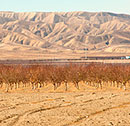California’s agriculture industry is relying too heavily on groundwater to irrigate drought-stricken farmlands — a trend that will not be sustainable long-term, according
 to a study by the University of California, Davis. The drought, which is the third most severe on record, is responsible for the greatest water loss ever seen in California agriculture, with river water for Central Valley farms reduced by roughly one-third, the study found. Groundwater pumping will likely replace most river water losses, and some areas have more than doubled their pumping rate over the previous year. If the drought continues for two more years, the report says, groundwater reserves will continue to be depleted to replace surface water losses and pumping ability will slowly decrease, which could affect crop production. So far in the current drought, 428,000 acres of cropland — roughly 5 percent — has been made fallow across the Central Valley, Central Coast, and Southern California.
to a study by the University of California, Davis. The drought, which is the third most severe on record, is responsible for the greatest water loss ever seen in California agriculture, with river water for Central Valley farms reduced by roughly one-third, the study found. Groundwater pumping will likely replace most river water losses, and some areas have more than doubled their pumping rate over the previous year. If the drought continues for two more years, the report says, groundwater reserves will continue to be depleted to replace surface water losses and pumping ability will slowly decrease, which could affect crop production. So far in the current drought, 428,000 acres of cropland — roughly 5 percent — has been made fallow across the Central Valley, Central Coast, and Southern California.

Central Valley orchard